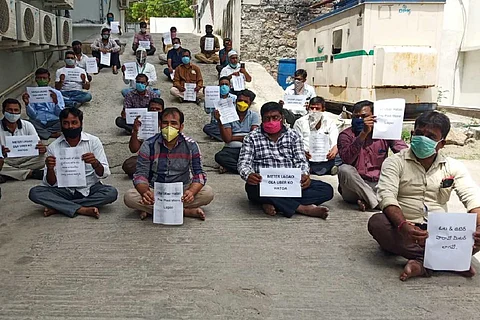

Highlighting issues being faced by driver and delivery executives in India in light of the COVID-19 pandemic, the Indian Federation of App Based Transport Workers (IFAT) are conducting peaceful and silent protests in different parts of the country.
IFAT said in a statement that drivers and delivery workers from more than 12 states are participating in the strike to make their demands heard. On Monday, app-based workers from Ola, Uber, Swiggy, Zomato, Rapido and Dunzo participated in the strike, including 22,000 workers from Hyderabad, 17,000 from across Karnataka, 4,000 in Kolkata, among others.
These app-based workers claim that they are not being provided with adequate safety gear by the companies they deliver or drive for. They demanded that companies enhance the existing measures and provide fresh safety kits to drivers and delivery workers.
They also want a revised payment and incentive structure, taking into account the reduction in consumer demand and working hours due to curfew restrictions, which reduces the number of rides or orders they can service.
“In Hyderabad the peaceful protest was held in front of the Uber office. In Bengaluru, Delhi and Kolkata too, the protestors maintained social distancing and informed people about the issues faced by Ola and Uber drivers. Although the protest was peaceful, nonviolent, and followed social distancing norms, our federation members were arrested in Jaipur,” Shaik Salauddin, National General Secretary said.
The protests will go on till June 10.
Food delivery executives
In the case of food delivery executives, they claim that the number of orders have declined due to removal of cash-on-delivery option as well. As a result, the existing delivery workers, who are paid on a per-delivery basis, do not get enough orders, which leads to longer wait times through the day, more unpaid travelling and a decline in their income.
“In spite of delivery workers being recognised as essential service providers and few cases of delivery workers being tested positive for the coronavirus, the food delivery companies have not escalated their safety precautions. For instance, Swiggy provided only a one-time amount of Rs 200 to its delivery workers for sanitiser in March. This symbolic measure by the company is hardly sufficient considering the speed with which the virus is spreading and the vulnerable role of the workers in ensuring essential services. It is a company’s responsibility to ensure safety of its workers and their families and the customers. Only ensuring contact-less and cash-less delivery is not sufficient for the fight against the coronavirus,” IFAT said in a statement.
These workers have demanded that companies either provide them with a new safety kit consisting of a good-quality face mask, gloves and hand sanitizer, or release an amount of Rs 1,000 for each delivery worker for them to procure the kit directly.
Food delivery executives claim that Swiggy and Zomato have reduced the incentive structure and per order earning to as low as Rs 15 per order, even as they charge customers a higher delivery fee.
Moreover, lesser orders also means that they aren't able to meet the requirements to get incentives
“Food delivery workers are spending more than 12 hours on the road to earn about Rs 500. We demand that the food delivery companies be sensitive to the working condition of the worker and revise the incentive structure to something that can be practically achieved in less than 10 hours,” Shaik said.
They also want Swiggy and Zomato to temporarily stop onboarding new delivery workers and ask the existing workers to report for work on rotation-basis on weekdays when the orders are less so that ‘every worker gets equal and fair chance to earn money’.
App-based transport workers
Ola and Uber drivers want the company to provide them with adequate Personal Protective Equipment (PPE), sanitisers, disinfectants etc., and also want plastic screens/shields between the driver and passenger in all app-based vehicles, which they claim have only been provided to vehicles leased from them.
They also want an increase in fares for app-based cabs to be able to cover the cost of higher petrol and diesel prices.
Drivers have also demanded that the commission be reduced from 20% to 5%.
“We also want the government to advise app-based companies to provide health insurance coverage to all its drivers and riders and state governments to issue proper guidelines to police and other administrative agencies on the permission available for the cab aggregators and delivery companies to operate without drivers/riders being harassed,” Shaik added.